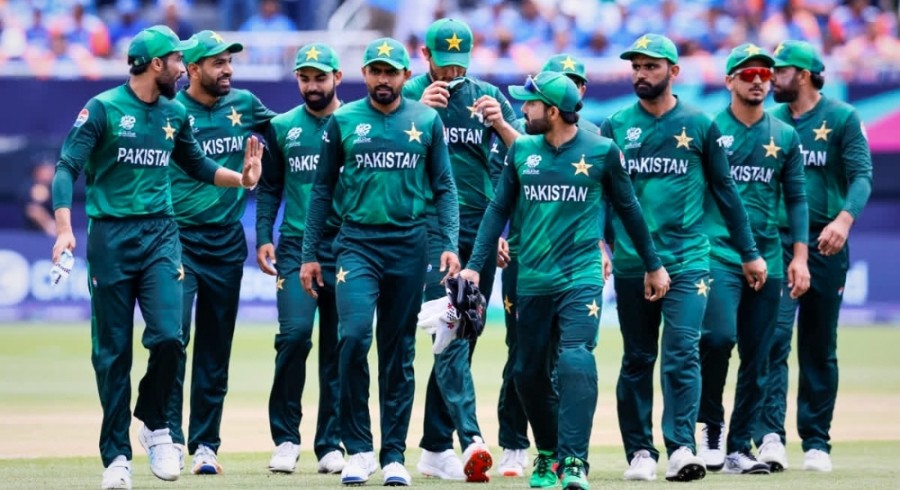Once ranked No. 1, Pakistan is now seventh in T20 rankings
 PHOTO:AFP
PHOTO:AFP
If I claim that in 2024, Pakistan’s T20 international team has performed on par with Rwanda, you might consider it a joke. However, it’s a bitter truth. Once known for setting records in victories, the Green Shirts have endured 16 defeats this year—the highest by any team, matched only by Rwanda, an emerging team in African cricket. This comparison isn’t the only embarrassment for us; in the past, we lost to the USA in the World Cup and have been defeated by several smaller teams. It’s been two years since we won an important match against a major opponent.
Once ranked No. 1, Pakistan is now seventh in T20 rankings. The players themselves are largely to blame. Instead of adapting to modern demands, they prioritized personal achievements, letting their own rankings soar while the team’s standings plummeted. Treating the team as a personal fiefdom, they resisted the emergence of new talent for years. Now, as losses pile up, even their personal rankings have suffered. PCB officials also proved powerless against player power, emboldening some players to see themselves as bigger than the game.
The new PCB administration has taken steps to curb this, but the damage has already been done. It will take significant time to recover. Criticizing from the sidelines is easy and lucrative, as many former cricketers, like Aaqib Javed, have shown. While Aaqib criticized others extensively during his TV stints, he seems to have forgotten his own statements after taking a position of power. As head coach and selector, he has made decisions he once vehemently opposed. For instance, he repeatedly targeted Babar Azam and Mohammad Rizwan for their opening partnership. Yet, upon gaining authority, he sent the same duo out to open.
Faced with criticism over their traditionally slow starts, Aaqib tried a fresh opening pair of Saim Ayub and Rizwan in the next game against South Africa. While it was a sensible decision, why did someone have to remind him to make it? From the outset, there were concerns that Pakistan would struggle in South Africa, and that’s exactly what has happened. We can only win when opponents rest their key players; against full-strength teams, losses are inevitable.
Take the example of Usman Khan: despite his repeated failures, Aaqib has persisted with him. If another selector had done the same, Aaqib would have called them out. While moving back to Pakistan from the UAE might seem like a sacrifice on his part, it also served his interests. How long can Pakistan afford to reward him for this “favor”?
Aaqib, a former pacer himself, now finds his bowling attack unable to defend 206 runs, which raises serious concerns. PCB’s experiment with foreign coaches has also faltered. Gary Kirsten and Jason Gillespie both resigned recently. I met Gillespie a few months ago, and he spoke confidently of plans he ultimately failed to execute.
Foreign coaches often adhere strictly to directives in their home countries or India but come to Pakistan with endless demands: appoint my assistant coach, make me a selector, or let me work remotely. When denied, they resort to resignation threats. PCB interim chief Mohsin Naqvi has taken a firm stance against player and coach power. He refused to bow to their pressures, even when it meant losing them. This no-nonsense approach is commendable, but it’s now up to Aaqib Javed to prove himself with tangible results.
In the England series, Aaqib made good decisions regarding pitch preparation and player selection, which worked. However, Pakistan’s public memory is notoriously short. A few more losses, and calls for his removal will surface. PCB doesn’t have someone like Atif Rana or Sameen Rana, who supported Aaqib through Lahore Qalandars’ many failures. He now faces immense pressure to deliver consistently.
Mohsin Naqvi demonstrated exceptional leadership during the Champions Trophy, earning credit for Pakistan’s strong showing. It’s time he also focused on fixing cricket affairs. Unfortunately, he faces a shortage of competent PCB officials. Many have recently left their posts. While some, like Usman Wahla, enjoy undue privileges, others like COO Salman Naseer remain indispensable despite changes in their roles.
It’s time for other officials to step up and share the burden. If the captain must manage everything, what’s the point of having a team? Mohsin Naqvi has shown he’s capable of taking Pakistan cricket forward. Now, the rest of the PCB must rally behind him to ensure success.